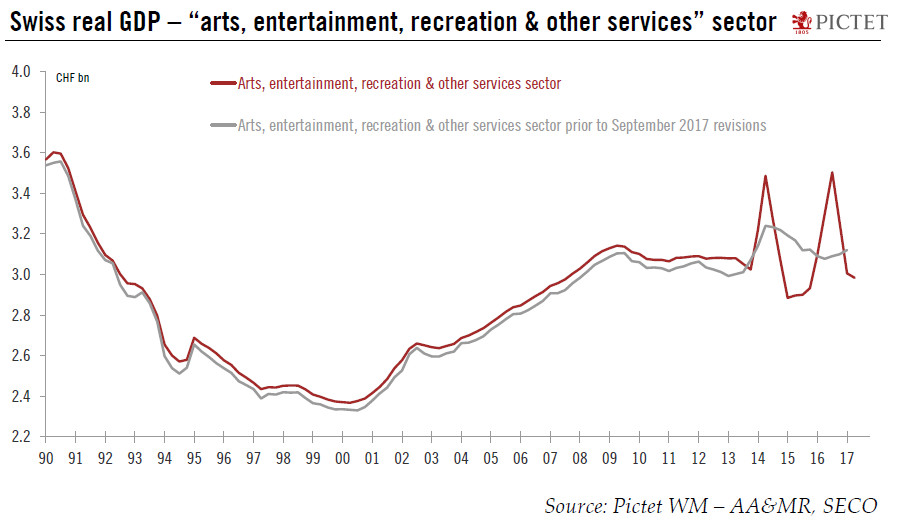Prospects look bright for Switzerland next year- thanks in part to the manna received from important world sports events.According to SECO’s estimates, the Swiss economy contracted in the final quarter of 2016, while Q3 2016 and Q1 2017 figures were revised down. The downturn in SECO’s GDP figures was exacerbated by special effects related to the inclusion of sports events in the “Art, entertainment, recreation and other services” sector. “Art, entertainment, recreation and other services” account for 2% of Swiss real GDP. Variations in income from international sports events therefore can have an impact on growth, as the income generated by licensing goes to sporting associations like FIFA, UEFA and the International Olympic Committee, which all have their headquarters in Switzerland.The
Topics:
Nadia Gharbi considers the following as important: Macroview, Sports economy, Swiss economic forecast, Swiss economy
This could be interesting, too:
Investec writes Swiss economy stalls in second quarter of 2023
Cesar Perez Ruiz writes Weekly View – Big Splits
Cesar Perez Ruiz writes Weekly View – Central Bank Halloween
Cesar Perez Ruiz writes Weekly View – Widening bottlenecks
Prospects look bright for Switzerland next year- thanks in part to the manna received from important world sports events.

According to SECO’s estimates, the Swiss economy contracted in the final quarter of 2016, while Q3 2016 and Q1 2017 figures were revised down.
The downturn in SECO’s GDP figures was exacerbated by special effects related to the inclusion of sports events in the “Art, entertainment, recreation and other services” sector.
“Art, entertainment, recreation and other services” account for 2% of Swiss real GDP. Variations in income from international sports events therefore can have an impact on growth, as the income generated by licensing goes to sporting associations like FIFA, UEFA and the International Olympic Committee, which all have their headquarters in Switzerland.
The value added by the “Art, entertainment, recreation and other services” sector increased by 6.7% in 2014, a year when the football World Cup in Brazil and Winter Olympics in Russia took place. In the following year, there were no big competitions, and so the sector’s value-added contracted by 11% in Swiss GDP figures. In 2016, when the Olympic Games and the UEFA European Championship were held in Brazil and France, respectively, valued added rose again, by 13.3%. In all, Swiss annual real GDP growth was boosted by 0.2 percentage point in 2016.
In 2018, the holding of the Winter Olympics in South Korea and the football World Cup in Russia will again boost growth, but make quarter-over-quarter growth more volatile. The effects of international sports events fall outside cyclical economic factors, but have to be taken into account when forecasting annual Swiss GDP growth.
All in all, since Switzerland is a small and open economy, GDP data are particularly volatile. The better integration of sport events will add to this volatility. However, we believe the state of the Swiss economy is not as bad as the headline GDP number suggests and our 2018 forecast has been left unchanged at 1.7%.
Over the coming quarters, Swiss exports are set to benefit from the global economy’s solid momentum, all the more so if the Swiss franc, which fell in value during the summer, maintains its current level. Domestic demand is expected to gain momentum as well. Specific factors such as international sports events will have a favourable impact on GDP growth.
